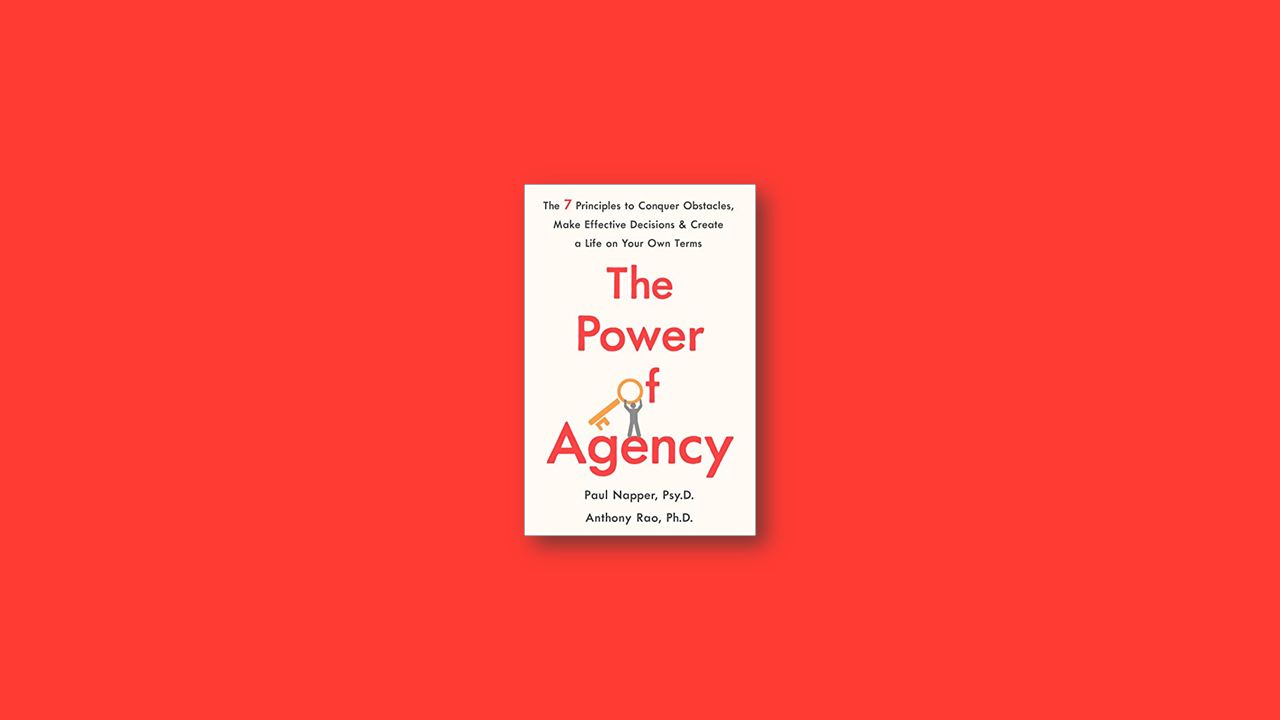In the Power of Agency, the renowned psychology experts Paul Napper and Anthony Rao help you break through your state of overwhelm by showing you how to access your personal agency with seven empowering principles: control stimuli, associate selectively, move, position yourself as a learner, manage your emotions and beliefs, check your intuition, deliberate and then act.
Principle #1 A Clear Head
Remove yourself. Seek a quiet place where you can reflect and concentrate. Place your focus onto what’s of most importance right now. Seek only the information you need to do the job at hand. Ask for help from friends, family and coworkers to process information if you need.
Minimize your exposure to distracting and misleading junks. Ditch multitasking unless it’s absolutely necessary. Turn the ringer off and leave the phone in a room you can’t easily reach. Go analog and paper whenever you can.
Pay attention to your time online. Prescribe limits to social media usage. Take a walk at least once per day for twenty to thirty minutes, preferably in nature and without your smartphone.
Principle #2 The Company You Keep
Seek people who lift your mood up and increase your willpower. Build a diverse circle of friends and associates to enrich your fabric of life. Receive help and give help to others who need you most.
Read and interpret deep motivations of people. Recognize that what you feel can about someone can cloud your ability to see their deeper self. Distance yourself from individuals or groups when you register uncomfortable feelings. Transmit your joy and ease to others. Let people feel the greater presence of you.
Principle #3 Respect Your Body
Exercise regularly and practice deep breathing to combat the negative effects of cortisol and trigger upward spiral in life. Listen and learn to accurately interpret the signs your body is trying to tell you.
A dose of nature sparks the brain and body. Stop sitting for hours. Move at least every thirty minutes, even if you do so briefly. One way to do so is to seek new experiences and explore new places.
Pay attention to what you consume. Your body needs to be well nourished and in balance. Listen to your body signals, take breaks and naps if necessary. Above all, make sleep the first priority.
Principle #4 Learn Always and in All Ways
Pursue novelty in all ways to open up your mind. Embracing mistakes is the key aspect of learning. Focus on recovery and figure out what and where you need to improve.
Take in a diverse range of viewpoints, experiences and knowledge to accelerate your learning. Employ first-hand learning method if possible. Don’t dominate conversations. Listen more and try not to fill in the silence. Open up space for others to fill in.
Train yourself to ask more questions. Don’t be afraid of looking stupid. The more you do this, the easier it becomes.
Consistently focus on relaxing your mind and muscles. Doing so projects calmness to encourage a higher quality dialogue and knowledge exchange from others. Take time and energy to consider the ideas and recommendations of experts.
Principle #5 Stable and Grounded
Learn to identify your emotions, recognize their values and express them at the right place and right time, with the right level of intensity. Remember you don’t need to act on your emotions. Talk them out, focus on your breath and meditate to let them go.
Occasionally zoom out to shift your worldview to a broader landscape. It will protect you from getting too caught up in the routine. Challenge your negative beliefs and assumptions – young people are reckless – expensive wine always tastes better – it sets the stage for effective critical thinking.
Principle #6 Use Your Inner Wisdom
Disrupt the routine. Get up and get moving. When your body goes, your mind flows.
Learn to pair intuitive thoughts with your logical reasoning in order to make better decisions and handle the situation at hand. Gather more viewpoints and information to challenge your intuition.
Throughout each day, engage in repetitive physical movement to ensure the optimal operation of your mind and muscles. But make sure you listen to your body and adjust rest to allow recovery.
Principle #7 Reflect, Decide and Act with Agency
Know the line between objectivity and your emotions, beliefs and desires. Recognize how the latter influence your decision-making. Make room in your head for competing thoughts and feelings. They help you generate creative and novel solutions. Engage in after-action review (AAR) to learn from your errors as well as your success.
Be familiar with common thinking traps you fall into so that they don’t impede a reliable and thoughtful decision process in the future. For big decisions, don’t rely on just one person’s opinion. Verify facts, figures and think through yourself. And most importantly, avoid getting caught up in indecision and endless what-ifs. Act before events unfold and act on you.

